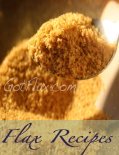Flax Oil for Dogs?
by pj driscoll
(rochester, mn)

Flax Oil for Dogs or Ground Flax for Dogs?
Which is better for a dog?
Ground flaxseed or flaxseed oil for dogs?
My dog weighs about 40lbs, so how much should I give him?
These are important because our dogs and pets need excellent nutrition!
*****First question:
Which is better? Ground flax or Flax oil for Dogs
The best food is food that is closest to the source that has the least amount of processing done to it. This is true for people and our pets.
When you look at the process of how we get ground flax vs flax oil, you will see there are pros and cons of each and you can decide for yourself what is the best.
Here are the differences:
Ground flax for dogs-
 Flax is a small seed that is so tiny that in order to get all the benefits of the Omega 3, protein, fiber, vitamins, minerals and nutrients in it, the seed needs to be ground...
Flax is a small seed that is so tiny that in order to get all the benefits of the Omega 3, protein, fiber, vitamins, minerals and nutrients in it, the seed needs to be ground...
otherwise it will mostly pass right through the digestive system.
So, flax should always be ground or if you buy it ground, be sure it is cold milled otherwise ground flaxseed may be rancid. Flaxseed should always taste good, smell good and not have a bitter aftertaste.
Read more about why cold milled ground flax for dogs is so important.
Flaxseed oil for dogs-
With Flax oil, the seed has to be squeezed to get the oil of the seed out. How the processing of the seed is handled is very important to what the quality of the flax oil will be.
Flax oil is a fragile omega 3 oil, like olive oil.
When the oil is heated up the omega 3 oil will start to denature, break down and go rancid.
So, in order to have quality flax oil, it must be processed by cold pressing flax and then the oil must be stored in a cool refrigerated environment.
The Important Taste Test
The taste test is essential -if it taste bitter or yucky, then it may have been exposed to heat during the pressing process or storage and the flax oil may be rancid -aka spoiled.
The next thing to consider is what are we missing when we have just the flax oil?
Our pets miss out on: Lignans, protein, and fiber: soluble, soluble and mucilage fiber. These are excellent nutrients and are valuable for our pets; a little extra protein and fiber will benefit our pets.
 Sometimes lignans are added back into flax oil. The problem with this is that flax hull lignans are the outside hull of the seed and are very dry and powdery.
Sometimes lignans are added back into flax oil. The problem with this is that flax hull lignans are the outside hull of the seed and are very dry and powdery.
So, not many lignans can be mixed with the flax oil without it being very thick paste and what naturally happens is the lignans are left on the bottom of the container.
Flax oil cost more because of the process. But some people prefer flax oil for dogs to flaxseed and that's fine as long as they are getting a balanced diet.
I would say it's fine for pets as well, just be sure it is quality flax oil- you don't want your pet eating rotting flax oil when the goal is to provide better nutrition! (This is true for any nutrition -for people and pets!)
Our Recommendation-
I often recommend just cold milled ground flaxseed because the value is incredible!
However, quality flax seed oil is an excellent addition if your pet is needing extra Omega 3 in their diet if they are having problems such as arthritis, Very itchy or scaly skin, Dandruff + frequent scratching, and weakened immune system among other problems.
You could always try an experiment with your pet, for 1 month, give your dog ground flax for 1 month and then the next month, give your pet flax oil. See which one seems to give your pet more benefits.
My dog weighs ~ 40lbs, how much should I give?
Based on the research of both Dr. Julian Whitaker and Dr. C. Leigh Broadhurst, PhD, since your dog is 40 lbs, you should give him between 2-1/2 teaspoons to 1 Tablespoon.
Both doctors have their specific recommendations which you can read here at how much omega 3 to give your pet.
What is Best for Your Pet
There is no exact and perfect diet for every person or pet. Each pet is different and will have different nutritional needs. You will know your pet the best!
Try out our cold milled ground flax or cold pressed Flax oil.
Your pet will thank you for taking care of their health and giving them quality nutrition.
Thank you for your question! Here's to your Pet's health!
~Ellie
- Read about Omega 3 Flaxseed benefits for Canine Health Problems
- Read more about Flax Benefits
- Want to taste quality flax? - buy Flax seed
- Read more about benefits of Flaxseed oil for dogs, ground flax or flax oil for dogs, ground flax for dogs
Back to home page from flaxseed oil for dogs, ground flax or flax oil for dogs, ground flax for dogs ground flax or flax oil for dogs, ground flax or flax oil for dogs, ground flax or flax oil for dogs, ground flax or flax oil for dogs
How to Eat Flaxseed
Flax Information
Flax for Diabetics
How Much Flaxseed
Weight Loss + Flax
Gold or Brown Flax
|
Share Your Flax Story







 |
|  |
| 